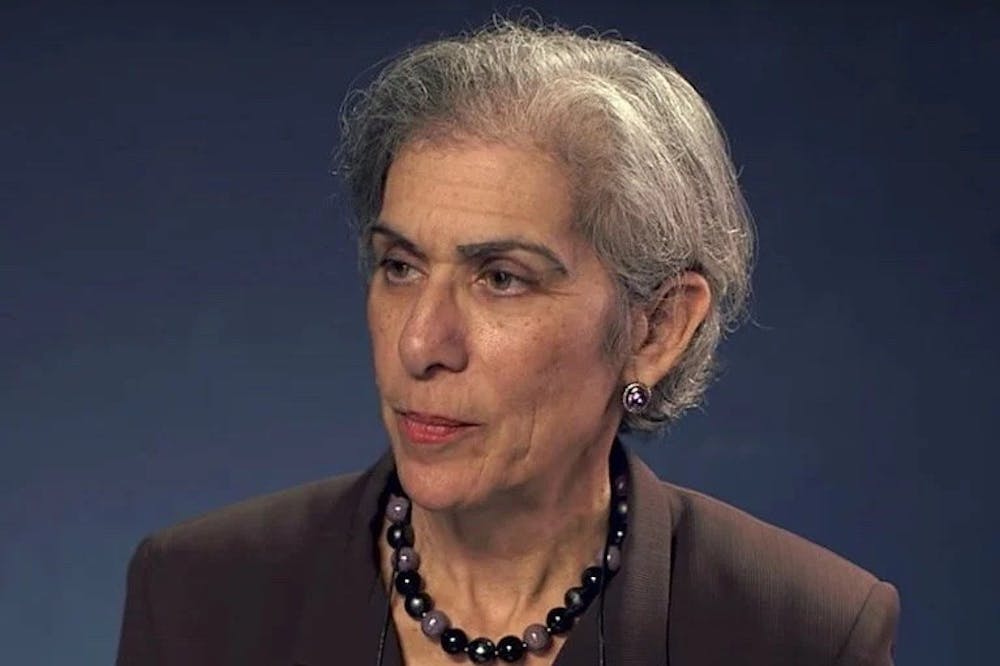Penn Law School Dean Ted Ruger requested that the Faculty Senate impose a “major sanction” against tenured Penn Law professor Amy Wax, an action that brings the University closer to potentially terminating the controversial academic.
In a 12-page report sent on June 23 to Faculty Senate Chair Vivian Gadsden, Ruger argued that Wax’s bigoted public statements and her behavior on campus and inside the classroom have violated multiple University standards for faculty, citing numerous student and faculty accounts of the conduct that he believes warrants disciplinary action. Ruger requested that the Faculty Senate convene a hearing board to conduct a full review of Wax’s conduct and ultimately impose a major sanction, in line with the University's policy for punishing tenured faculty members.
“Academic freedom for a tenured scholar is, and always has been, premised on a faculty member remaining fit to perform the minimal requirements of the job,” Ruger wrote in the letter. “However, Wax’s conduct demonstrates a ‘flagrant disregard of the standards, rules, or mission of the University.'”
University policy describes a major sanction as “termination; suspension; reduction in academic base salary; zero salary increases stipulated in advance for a period of four or more years.”
In a statement, Penn Law spokesperson Meredith Rovine wrote to The Daily Pennsylvanian confirming that the charges against Wax will now be evaluated by "a group of her peers" among the University's tenured faculty. She added that the Faculty Handbook permitted no additional comment on the substance of the charges.
"[The University Faculty Senate process] called for, and continues to involve, careful investigation and deliberation in order to protect the students, faculty, and staff who comprise this institution, and to provide fairness and due process to all involved including Professor Wax," Rovine wrote. "Such a process takes time, and thought, and involves multiple decisionmakers."
Wax did not immediately respond to a request for comment. University spokesperson Ron Ozio wrote in response to a request for comment that Penn Law was handling media requests regarding the report.
Ruger's report to the Faculty Senate — a governing body that includes an elected committee and serves as the representative voice for full-time teaching faculty — was published online on July 13 by the Foundation of Individual Rights and Expression, a nonprofit free speech advocacy group. It is not clear how the group accessed the report, as the University has maintained a confidentiality policy surrounding the review of Wax's conduct that Ruger began in January.
RELATED:
Princeton fires tenured professor, citing inappropriate relationship with student
Penn community urges Magill to drive change on campus, in Philadelphia as president
The Penn Law alumni quoted in Ruger's report, most of whom are Black, detail instances of Wax making racist remarks in front of them against people of color and LGBTQ individuals. In one instance, Wax allegedly told 2012 Penn Law graduate Lauren O’Garro Moore, who is Black, that she had only become a double Ivy “because of affirmative action.”
The report goes further than Penn Law’s previous statements regarding Wax, who has sparked successive waves of criticism this year by making repeated racist, xenophobic, and homophobic comments in interviews with podcast hosts and television personalities like Tucker Carlson. While Ruger initiated the sanctions process in January to determine whether Wax threatened the University’s mission by violating behavioral standards, the Penn Law dean has now determined that Wax’s conduct merits a major sanction.
2022 Penn Law graduate Apratim Vidyarthi, who has spearheaded student efforts to fire Wax, previously advocated for Ruger to request major sanctions against Wax rather than minor sanctions, which the University defines separately and range from a letter of reprimand to ongoing monitoring. After Wax claimed that "the United States is better off with fewer Asians and less Asian immigration" in December, Vidyarthi and other Penn Law students created a petition that garnered over 2,500 signatures from Penn Law students, Penn community members, and students from other law schools.
Vidyarthi praised Ruger's report for its "really strong" wording, but told the DP that he hopes whoever released the report publicly took the right precautions to avoid jeopardizing the confidentiality of the process. He said that Ruger's request for a major sanction against a tenured faculty member constituted a "really big step" that the University has not taken in a long time.
"Looking at the actual testimony of former students, it's heartbreaking to see that people have had that experience, but it also just indicates that it's already too late for some – she should have been fired a long time ago," Vidyarthi said.
If Wax is fired or resigns – which she said she would not do "without a fight" — she would join other high-profile university faculty like Princeton professor Joshua Katz and Georgetown professor Ilya Shapiro, who left their institutions this year amid controversies over their views. Princeton dismissed Katz in May, while Shapiro left Georgetown in June.









